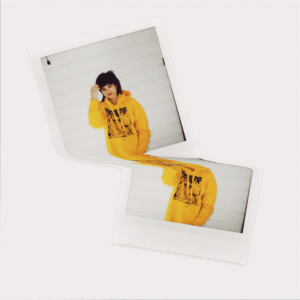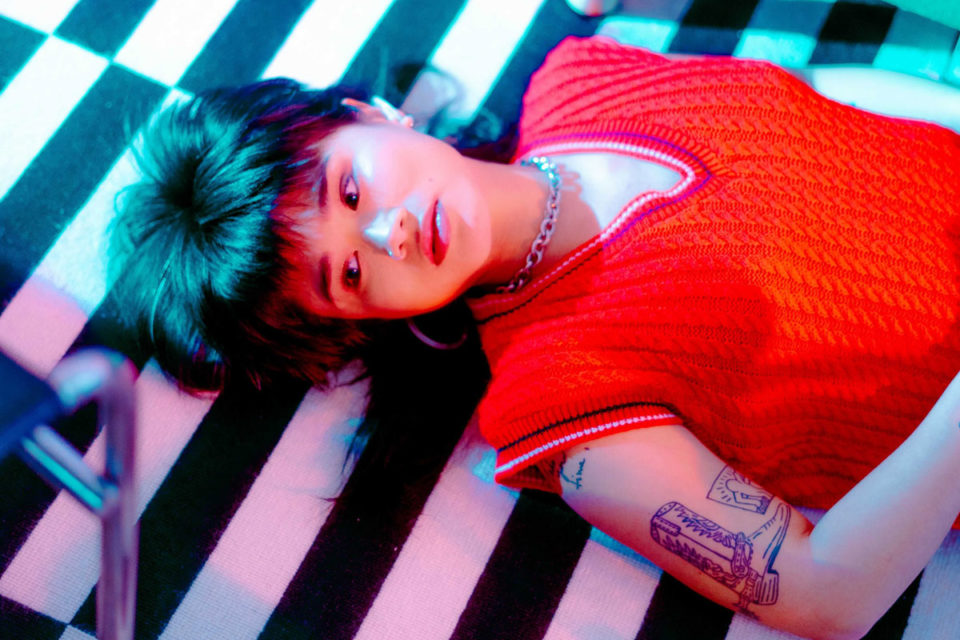
Project: 12 Songs About Loneliness
Two days before her wedding, Amanda Bantug was freaking out. Her fiancé was a no-show to a group hang at a Nashville cocktail bar, and her mind began to cycle through a list of worst-case scenarios. Twenty-four phone calls and 45 minutes later, Bantug was relieved to hear that her betrothed was OK.
That harrowing experience led to the layered and propulsive single “High Worry” from Bantug’s debut full length, 12 Songs About Loneliness. “All these morbid thoughts keep me from living,” Bantug sings over her own pristine, synth-driven production. As much as her lyrics deal with the sort of immobility that’s caused by intrusive thoughts, the music is open, self-assured and expansive.
The Georgia-born, Nashville-based multi-instrumentalist and producer picked up guitar from her musician father before she entered her teen years. She applied her skill at self-sufficient music-making to her album, playing most of the instruments herself, while leaving space for unplanned magic to happen. The jazz-influenced album closer “Look After Yourself” is a case in point. After accidentally playing an odd chord inversion on her keyboard, Bantug opted to keep the distinctive moment instead of deleting her part and replaying it. That’s the kind of confidence that doesn’t show up on many first albums.
The dream pop artist shows impressive restraint on the mid-album stunner “Here We Go Again,” leaving her swooning vocal largely unadorned. Aside from the acoustic guitar accompaniment, it sounds almost like a voice memo. It’s forty-nine seconds of simple bliss, closing with a question posed to the one listener in the room, Bantug’s cat: “PJ, do you like it?”
On The Record: A Q&A With Bantug
Adam Culver: Your first-ever full-length, 12 Songs About Loneliness, is out. Sounds like it was four years in the making. We hear a lot about records that take a serious amount of time to make. Could you let us in a little bit on what specifically was happening over that time?
Amanda Bantug: I really never even set out an intention to make an album. I just realized that I was making so many songs, and a handful of them that I really liked kind of had the same context about being lonely; that’s what the album is about. After writing for two years, I was like, “Oh, I can piece this together.” And then I found a mixer—shout out to Josh Lovell—and we kind of just made it an album.
AC: And you produced it as well, right?
AB: I did. I had a dear friend, Grayson Proctor, help on one song and another guy named Josh Williams. They each helped on one song.
AC: The instrumental parts all sound pretty cohesive: basslines, guitar lines, drum patterns. Is that all your playing?
AB: I had a couple of friends play some things, because I can play a lot of instruments, but I don’t play all of them well by any means. I’ll get the ball rolling and then send it to someone and be like, “Can you make this sound like music?”
AC: When you’re working as artist, producer, engineer, player, it can be a challenge to stop working on something. How do you know when a song is done?
AB: I guess just when it feels right. Honestly, I know what you’re saying and I’ve definitely been in that kind of space, but I’m actually pretty good about stepping away from something once it feels good. I don’t overwork things too much, actually.
AC: Would you give me a little bit of your musical of origin story?
AB: My dad was a total rock star back in the eighties. I mean, like he wasn’t, like, famous, but he was in this band and they would do a bunch of covers. They had some originals, but I think they were mostly a cover band. My dad’s side of the family is very, very musical. All my cousins sing and play instruments actually way better than me. But yeah, he just started doing guitar lessons with us once a week, me and my family. And then I started playing all the time. I think School of Rock was actually monumental, to my motivation to keep playing. Then I started doing that thing Pheobe does on “Friends” where she sings really silly stuff. A lot of the way that I express myself is through humor. So I was doing that and then it kind of turned into songwriting. Then my grandpa died when I was ten; I think that was one of my first songs that I wrote about it. I just kept writing.
AC: There’s this synth-driven feel to a lot of the record. What were your musical reference points? Did you have particular things you’d look to for inspiration or is it all just internalized, to where you feel it just come out of you?
AB: I think a little bit of both. I do the classic thing: I’ll listen to only two to three records a year, and they’re probably from 2015 to 2018 still, because I can’t move forward. I know that when I was writing “Retrograde,” I was listening to that St Vincent album Masseduction heavy and I was listening to Control by SZA. I honestly wasn’t listening to too much music that like sounds like what I was doing. I kind of do that on purpose, because I’m really good at just making something that sounds exactly like what I’m listening to. So if I listen to artists that are so far out of my reach and zone, I feel like I won’t really make what they’re doing.
AC: Did you have particular sounds that you were aiming for?
AB: To be honest, I don’t think a lot about anything.
AC: I feel like your lyrics may say otherwise.
AB: OK, that’s true. Lyrics are a different story.
But the music, I just sit down and whatever comes, I’ll chase it down. There were a few moments where I’m like, “Oh, I have a vision for this thing.” For “Every Sunday,” I wrote that song two years ago and it was going towards a 1975 kind of feel. I tracked everything and had a good demo, but I just wasn’t really feeling it. So I kind of tossed it and I wasn’t going to use it. Then I only had 10 songs for the album. I wanted a couple more, and I really like this song, so I’m going to beat it. I basically stripped it down and put new production on it. It’s cool to marry an older song with the newer production that I’m doing. That was one moment where I was like, “I do have a vision for this and I’m going to go tackle it right now.” But most of the time I just sat down with these songs and whatever came out, there it is.
AC: I wanted to ask you about the first track on the record, “Be The Same.” It’s a really short, sort of intro feeling thing. And then there’s “Here We Are Again,” that’s kind of similar in that it’s one idea and it doesn’t go off and do a bunch of other stuff. Did you think about extending those and making them into big arrangements, or did you know that they were in their final form when they arrived?
AB: I think a little bit of both, because when you write a short idea, obviously you can make it into a thing. But I think for me, I just felt comfortable ending it there, because that’s all I really needed to say.
AC: Did the pandemic times affect your music listening habits? Being sort of isolated and at home more, did you find yourself reaching for different things?
AB: Totally, I was just listening to straight-up pop music all the time, because I was like, “I have to survive these really dark times and I want to feel alive in some way.” So I just like to listen to pop music. Pop music saved my life this past year.
AC: Now pop music, has gotten a lot more innovative, in its production, like, say, Charlie XCX or Tove Lo etc. With those boundaries of pop changing, not necessarily needing to sound a specific way, did it help free you to do whatever it was you were feeling?
AB: Oh, absolutely, because you only need a few elements to make a pop song, and then you can kind of just go off from there. I think we’re all stepping away from genres. It’s just moods and general vibe now. My music can be heard as pop music, but I think it’s also more than that in other ways. But I don’t really know how to describe it. I feel like you kind of just need to listen.
AC: It’s been really fun spinning High Worry on WNXP. When you hear your songs back after some time away from them, do they hit you in a new way?
AB: Totally, yes. I was actually in Joshua Tree when my album released, which was so fun. We just blasted the album on these speakers and looked at the sky. It was nice to listen to the album with the least amount of pressure and take in the beauty that was around me.
As I am now unpacking this, these songs kind of seem like they were written during the pandemic, but they weren’t at all. Which is kind of crazy.
AC: The record struck me as being perfect for right now, where we’re at, which is really something considering that it was written over this expanse of time and it wasn’t even necessarily planned out as a record. Do you find that the best musical moments happen by accident?
AB: Always, that’s why I never really try to get better instruments. I’m not bad at anything I do, but I’m not necessarily great. I like that, because I’m always messing up and making these happy accidents.
AC: Are there any songs you can call out that reflect that attitude, “This is not what I meant it to be, but I like it better than what I was after?”
AB: The last song, “Look After Yourself.” I was learning how to play a jazz rendition of some other song and I played this one chord in a really funky way. Now that’s the main piano line in “Look After Yourself.” I didn’t mean to do that, but I start playing it and it became the whole song. Then I got my friend Tasty to play on it, and I was like “Would you like naturally play something like that?” He was like, “No, that’s nothing I would have happened upon.” So that’s definitely a full happy accident.
AC: I think it’s such a beautiful bookend to the record and has this different feel. That cascading piano line feels like a cleansing or purifying thing to me after we’ve gone through this journey that’s dealing with a lot of heavy stuff.
AB: I love that you said it that way, because I didn’t even really think about it. Like, when I wrote this song, I sat there and thought, “This is the last song on the record.” It just ties everything up I was going through, and ended it on a nice resolving note.
AC: In a couple of songs, “In My Feelings” and “Retrograde,” you mention seasons of life. The release of this album, your first ever full-length, does it feel like the end of a season for you?
AB: Well, you know, when it is an end of a season, it’s the beginning of a new one, right?

